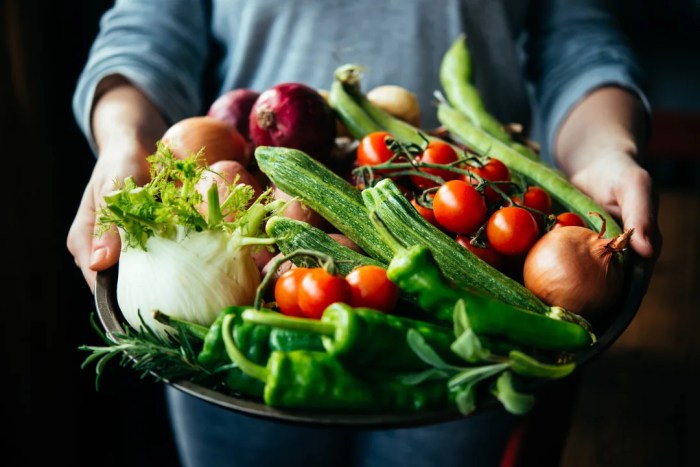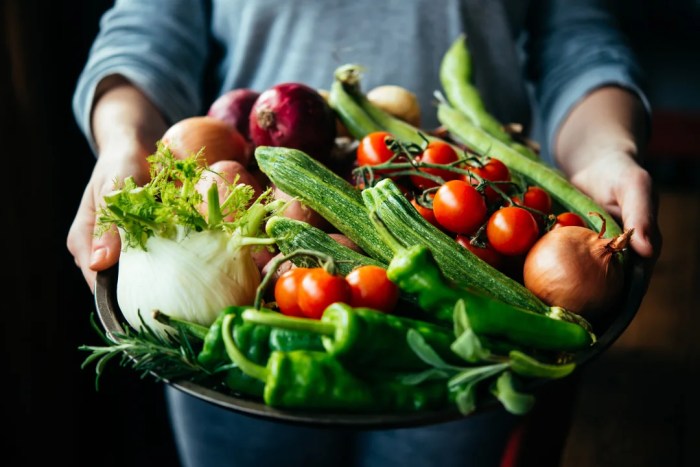What to eat when constipated is a common question, and this guide provides a comprehensive look at dietary strategies for relieving constipation. Understanding the role of fiber, hydration, and gut health is key to finding relief and establishing a regular bowel routine. This exploration delves into various foods, their fiber content, and how they can support a healthy digestive system.
Constipation can be uncomfortable and disrupt daily life. This detailed guide explores different fiber types, high-fiber foods, and the importance of hydration in promoting regular bowel movements. We’ll also look at prebiotics and probiotics, and their role in gut health, along with other lifestyle factors that can influence digestion.
Introduction to Constipation Relief Foods

Constipation is a common digestive issue characterized by infrequent bowel movements or difficulty passing stool. This discomfort can stem from various factors, including a lack of dietary fiber, insufficient fluid intake, a sedentary lifestyle, certain medications, and underlying medical conditions. Understanding the contributing elements and implementing a fiber-rich diet can significantly alleviate these symptoms.A diet for constipation relief emphasizes foods rich in dietary fiber, which promotes regularity and softer stools.
The key is to gradually increase fiber intake, as sudden changes can lead to gas and bloating. Furthermore, adequate hydration is crucial for softening stools and aiding their passage. The right balance of fiber types also plays a vital role in optimizing bowel health.
Dietary Fiber and Constipation Relief
Fiber is an essential component of a healthy diet, particularly for maintaining regular bowel movements. It’s categorized into soluble and insoluble types, each with distinct effects on digestion.
| Fiber Type | Source | Effect on Digestion | Example Foods |
|---|---|---|---|
| Soluble | Fruits, vegetables, oats | Softens stool, promotes bulk | Apples, beans, carrots |
| Insoluble | Whole grains, vegetables | Adds bulk to stool, promotes movement | Wheat bran, leafy greens |
Soluble fiber absorbs water, creating a gel-like substance that adds bulk to the stool and slows down digestion. This can help prevent diarrhea and promote regularity. Insoluble fiber, on the other hand, adds bulk to the stool without absorbing water. This promotes faster movement through the digestive tract, preventing constipation. A balanced intake of both types is crucial for optimal bowel health.
Hydration and Constipation Relief, What to eat when constipated
Adequate hydration is paramount for effective bowel movements. Water helps soften the stool, making it easier to pass. Insufficient fluid intake can lead to hard, dry stools, which can cause significant discomfort and straining during bowel movements. Aim for at least 8 glasses of water per day, or more depending on activity levels and climate. Other fluids like fruit juices, broths, and herbal teas can also contribute to hydration.
Importance of a Balanced Diet for Constipation Relief
A balanced diet that includes a variety of fruits, vegetables, whole grains, and lean proteins is essential for overall digestive health. These foods offer a diverse range of nutrients and fiber types, contributing to the overall effectiveness of the digestive process. Avoid processed foods, excessive sugar, and overly refined grains, which can hinder bowel regularity. Gradually increasing the intake of fiber-rich foods is essential to prevent bloating and discomfort.
High-Fiber Foods for Constipation
A healthy diet plays a crucial role in maintaining regular bowel movements. Fiber, an essential component of many foods, acts as a bulking agent in the digestive tract, promoting smoother and more frequent bowel movements. Incorporating high-fiber foods into your daily meals can significantly alleviate constipation symptoms and improve overall digestive health.Fiber is categorized into soluble and insoluble types.
Soluble fiber dissolves in water, forming a gel-like substance that can help slow down digestion and regulate blood sugar levels. Insoluble fiber, on the other hand, adds bulk to stool, promoting regularity. Both types are essential for optimal digestive function.
High-Fiber Fruits and Vegetables
Fruits and vegetables are excellent sources of dietary fiber, vitamins, and minerals. A variety of these foods should be included in a balanced diet to obtain a wide range of nutrients.
Feeling sluggish and needing a boost? Fiber-rich foods like fruits and vegetables are your best friends when dealing with constipation. Plus, remember, preparing for a job interview can be nerve-wracking, but check out these 9 ways to face a job interview without fear here. Don’t forget plenty of water to keep things moving smoothly! Focus on a healthy diet, and you’ll be feeling your best, both inside and out.
- Berries (strawberries, raspberries, blueberries): These small fruits are packed with antioxidants and fiber, promoting healthy digestion and boosting overall well-being. Their high water content also aids in hydration.
- Cruciferous vegetables (broccoli, cauliflower, Brussels sprouts): Known for their nutritional value, these vegetables contain a significant amount of fiber, contributing to healthy digestion and supporting a healthy gut microbiome.
- Leafy greens (spinach, kale, collard greens): These are excellent sources of fiber and vitamins, promoting regularity and aiding in nutrient absorption.
- Avocado: This creamy fruit is exceptionally high in both soluble and insoluble fiber, aiding in healthy digestion and promoting satiety.
- Prunes: These dried fruits are well-known for their ability to soften stools and stimulate bowel movements, making them a valuable remedy for constipation.
- Apples: Apples are a common and convenient source of fiber, supporting regularity and promoting healthy gut function.
- Pears: Pears provide a good source of fiber, aiding in digestive health and contributing to a feeling of fullness.
High-Fiber Grains and Legumes
Grains and legumes are important components of a high-fiber diet, providing a wide range of nutrients and promoting digestive health.
- Whole grains (brown rice, quinoa, oats): These grains are excellent sources of fiber, promoting regularity and aiding in nutrient absorption. Their complex carbohydrates provide sustained energy.
- Legumes (beans, lentils, chickpeas): Legumes are rich in fiber and protein, offering a complete source of nutrition that promotes satiety and contributes to a healthy digestive system. They are excellent for adding bulk to meals.
Benefits of Incorporating High-Fiber Foods
A diet rich in high-fiber foods can contribute to numerous health benefits beyond just relieving constipation. These foods promote healthy digestion, regulate blood sugar levels, and support a healthy gut microbiome. They also contribute to weight management by promoting satiety, which can reduce overall calorie intake.
Sample Meal Plan Emphasizing High-Fiber Foods
This meal plan is a sample and can be adjusted based on individual dietary needs and preferences. It highlights high-fiber foods in each meal.* Breakfast: Oatmeal with berries and nuts.
Lunch
Large salad with mixed greens, beans, and whole-grain bread.
Dinner
Lentil soup with whole-wheat bread.
Gradually Increasing Fiber Intake
Gradually increasing fiber intake is crucial to avoid digestive discomfort. Sudden increases can lead to bloating, gas, and cramping. Start by incorporating small amounts of high-fiber foods into your diet and gradually increase the portion sizes over time. It is recommended to drink plenty of water to help the fiber move through the digestive system.
Fiber Content of High-Fiber Fruits
| Fruit | Approximate Fiber (grams per 100g) | Other Nutritional Benefits |
|---|---|---|
| Apples | 2.4 | Rich in Vitamin C |
| Pears | 2.0 | Good source of potassium |
| Avocados | 5.0 | Healthy fats and potassium |
| Raspberries | 8.0 | High in antioxidants |
| Blueberries | 5.5 | Rich in antioxidants |
Foods Rich in Prebiotics and Probiotics

Fueling your gut with prebiotics and probiotics is a powerful way to improve digestion and overall well-being. These beneficial microorganisms play a crucial role in maintaining a healthy gut microbiome, which directly impacts your digestive health, immunity, and even mental well-being. A diet rich in these foods can contribute to better bowel movements and alleviate constipation.
Prebiotic Foods
Prebiotics are non-digestible fibers that act as food for beneficial bacteria in your gut. They stimulate the growth and activity of these good bacteria, creating a healthier gut environment. Including prebiotic foods in your diet can significantly improve digestion, promoting regular bowel movements and reducing constipation. Prebiotics are essential for a thriving gut microbiome, which in turn supports overall health.
Figuring out what to eat when you’re constipated can be tricky, but focusing on fiber-rich foods is key. Think plenty of fruits and vegetables, and don’t forget about whole grains. It’s also crucial to nurture your child’s potential, and exploring their talents early can be incredibly rewarding. Just like a healthy diet aids digestion, identifying and developing your child’s unique talents early on will set them up for success, much like finding the perfect remedy for constipation.
Finding the right activities for your child, much like finding the right foods, will make a big difference. By understanding what they enjoy and what comes naturally to them, you can encourage a lifelong love of learning and a healthy, well-rounded approach to life, as outlined in this insightful piece: why you should find and develop your kids talents early.
Ultimately, both your child’s development and your own digestion rely on good choices, and these choices can shape your future.
- Onions and Garlic: These pungent vegetables are excellent sources of prebiotics, containing fructans that feed beneficial bacteria. Adding them to your meals can boost the good bacteria population and enhance digestive health.
- Bananas: Bananas are rich in fructooligosaccharides (FOS), a type of prebiotic fiber that nourishes beneficial bacteria in the gut. Their potassium content also contributes to overall health and hydration.
- Leafy Greens: Vegetables like spinach, kale, and lettuce contain various prebiotic fibers that promote gut health and regularity. Incorporating a variety of greens into your diet provides a diverse range of nutrients and contributes to a healthy digestive system.
- Legumes: Beans, lentils, and peas are excellent sources of prebiotics, particularly oligosaccharides, which feed the beneficial bacteria in your gut. They are also a good source of protein and fiber, essential for overall health.
Probiotic Foods
Probiotics are live microorganisms, often bacteria, that are beneficial to your health. They are naturally found in fermented foods and can be added to your diet through supplements. Probiotics help to increase the good bacteria in your gut, which can improve digestion, support immune function, and potentially ease constipation.
- Yogurt: A popular dairy product, yogurt is a well-known source of probiotics. Look for yogurt with live and active cultures for the most beneficial effects.
- Kefir: A fermented milk drink similar to yogurt, kefir contains various beneficial probiotic bacteria. Its tangy flavor and creamy texture make it a delicious and healthy addition to your diet.
- Sauerkraut: This fermented cabbage dish is a rich source of probiotics. Its slightly tangy flavor and crunch make it a great addition to salads or as a side dish.
- Kimchi: A fermented Korean dish, kimchi is packed with probiotics and other beneficial nutrients. Its spicy flavor and unique texture add variety to your diet.
- Tempeh: A fermented soybean product, tempeh is a good source of protein and probiotics. Its nutty flavor and firm texture make it a versatile ingredient in various dishes.
- Kombucha: A fermented tea beverage, kombucha is another source of probiotics. Its slightly fizzy and tangy flavor provides a refreshing drink option.
Comparing Prebiotic and Probiotic Foods
The following table summarizes the prebiotic and probiotic foods and their respective benefits in alleviating constipation:
| Food Type | Example Foods | Benefits for Constipation |
|---|---|---|
| Prebiotics | Onions, garlic, bananas, asparagus, artichokes, leeks, oats, barley | Feed beneficial gut bacteria, promoting regularity and improving bowel movements. |
| Probiotics | Yogurt, kefir, sauerkraut, kimchi, tempeh, kombucha | Increase beneficial bacteria in the gut, aiding in digestion and potentially reducing constipation symptoms. |
Fluids and Hydration
Staying hydrated is crucial for overall health, and it plays a significant role in maintaining regular bowel movements. Proper hydration helps soften stool, making it easier to pass through the digestive tract. This, in turn, reduces the likelihood of constipation and promotes healthy digestion.Proper hydration, alongside a balanced diet rich in fiber, is key to a healthy digestive system.
The right amount of fluids helps facilitate the movement of waste through the intestines, preventing the stool from becoming hard and compacted. This crucial process prevents constipation and allows for efficient elimination.
Beneficial Fluids for Constipation Relief
Adequate fluid intake is essential for maintaining optimal digestive health. Water is the most basic and vital fluid for hydration and bowel regularity. Other fluids can also contribute significantly to relieving constipation. The key is finding fluids that are both hydrating and beneficial for your digestive system.
Figuring out what to eat when constipated can be tricky, but fiber-rich foods are your best bet. Think plenty of fruits and vegetables, and maybe even some whole grains. It’s important to remember that a healthy gut is essential for overall well-being, and a balanced diet plays a huge role in this. Just like you need a supportive and loving relationship, your digestive system needs the right fuel to function optimally, as highlighted in this fantastic article about 20 things everyone deserves in a relationship 20 things everyone deserves relationship.
So, stock up on those fiber-rich foods and keep your gut happy and healthy!
Types of Fluids to Include
A variety of fluids can contribute to better bowel health. Here are some options:
- Water: The most readily available and universally recommended fluid for hydration. Water helps soften stool and promotes its smooth passage through the digestive tract.
- Fruit Juices (in moderation): Certain fruit juices, like prune juice, are known for their natural laxative properties. However, excessive consumption of fruit juice can sometimes lead to digestive upset. A small amount of prune juice can help promote regularity, but it is best to consult with a doctor or registered dietitian for personalized recommendations.
- Broths and Soups: Broth-based soups, especially those made with vegetables, are excellent sources of hydration and nutrients. They can contribute to softening stool and promoting healthy bowel movements.
- Milk and Yogurt (in moderation): Milk and yogurt contain electrolytes and other nutrients that aid in hydration and digestive health. However, the effects can vary depending on individual tolerance.
- Herbal Teas (specific types): Some herbal teas, such as chamomile or ginger tea, can have a mild laxative effect. However, it is essential to choose herbal teas carefully, as some can have potential side effects. It is crucial to research specific herbal teas and their potential effects.
Importance of Hydration Throughout the Day
Staying hydrated throughout the day is essential for maintaining optimal bodily functions, including regular bowel movements. Dehydration can lead to stool hardening, making it difficult to pass. Drinking fluids regularly, especially between meals, helps keep the stool soft and promotes its smooth passage.
Comparing Effects of Different Fluids
The effects of different fluids on bowel movements can vary. For example, while water is generally considered the most effective for hydration and overall digestive health, certain fruit juices can have a laxative effect. It is important to consider individual tolerance and adjust fluid intake accordingly. Excessive consumption of some fluids, such as sugary drinks, can sometimes have a negative impact on digestion and overall health.
Other Important Considerations
Digestive health isn’t solely about the foods we eat; lifestyle factors play a crucial role. Understanding how sleep, stress, exercise, and even medications can impact bowel movements can significantly improve your overall digestive well-being. This section delves into these aspects, highlighting the importance of a holistic approach to constipation relief.A balanced approach encompassing diet, lifestyle, and potentially medical intervention is key to achieving lasting relief from constipation.
Considering these additional factors alongside dietary changes can lead to more effective and sustainable results.
The Role of Sleep and Stress Management
Adequate sleep is essential for overall health, including digestive function. Insufficient sleep can disrupt the natural rhythm of the body’s digestive processes. Similarly, chronic stress can negatively affect the gut microbiome and increase the likelihood of experiencing constipation. Managing stress through relaxation techniques like yoga, meditation, or spending time in nature can contribute to improved digestive health.
A consistent sleep schedule and stress-reduction strategies are vital components of a comprehensive approach to digestive well-being.
Other Lifestyle Factors Affecting Bowel Regularity
Several lifestyle factors influence bowel regularity. Maintaining a consistent routine for meals and bowel movements can often improve regularity. Dehydration can also lead to constipation. Staying adequately hydrated is important, as water is essential for the proper functioning of the digestive system. Likewise, lack of physical activity can contribute to constipation.
Regular exercise stimulates the digestive system and promotes healthy bowel movements. A sedentary lifestyle is a potential factor in impacting bowel regularity.
Medication Interactions and Constipation
Certain medications can have a side effect of constipation. Examples include some pain relievers, antidepressants, and iron supplements. If you are taking any medications and experiencing constipation, it’s crucial to discuss this with your healthcare provider. They can assess whether the medication is a contributing factor and explore alternative options or strategies to manage the constipation. Always consult with your doctor before adjusting any medication regimen.
The Significance of Regular Exercise
Regular physical activity is beneficial for overall health and can also contribute to improved bowel regularity. Exercise stimulates the digestive system, promoting the movement of stool through the intestines. Physical activity also helps to maintain a healthy weight, which is often associated with better bowel function. Examples of beneficial activities include brisk walking, jogging, swimming, or any other form of moderate-intensity exercise.
Incorporating regular exercise into your daily routine can positively influence your digestive system’s health.
Importance of Consulting a Healthcare Professional
If you experience chronic constipation, it’s essential to consult a healthcare professional. Chronic constipation can be a symptom of an underlying medical condition. A healthcare provider can diagnose the cause of your constipation and recommend the most appropriate course of action. They can also assess the effectiveness of dietary changes and other interventions. Seeking professional medical advice is crucial for managing chronic constipation and addressing potential underlying issues.
Closure: What To Eat When Constipated
This guide has provided a roadmap to understanding what to eat when constipated. By incorporating high-fiber foods, staying hydrated, and maintaining a healthy lifestyle, you can effectively manage constipation. Remember, a balanced diet rich in fruits, vegetables, whole grains, and fluids, combined with adequate sleep and stress management, plays a crucial role in achieving digestive regularity. If constipation persists, consult a healthcare professional for personalized advice.











